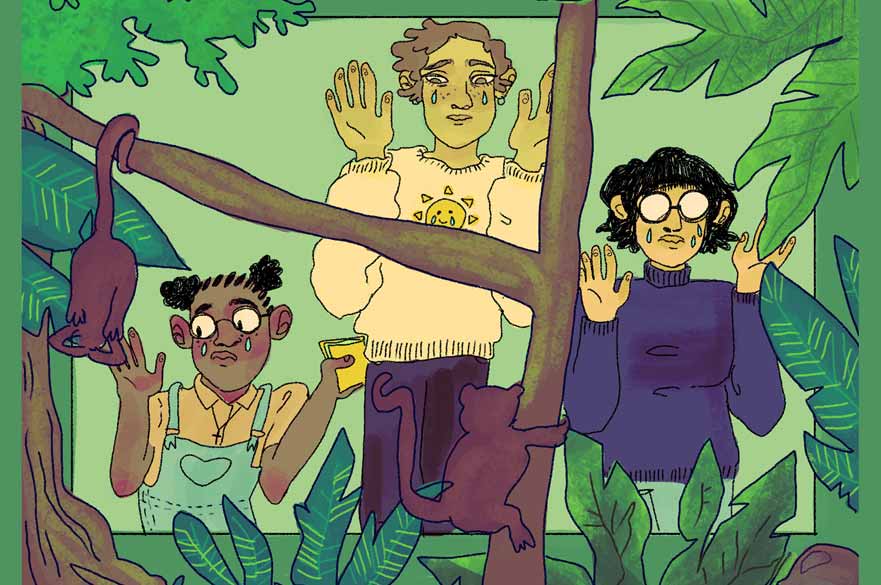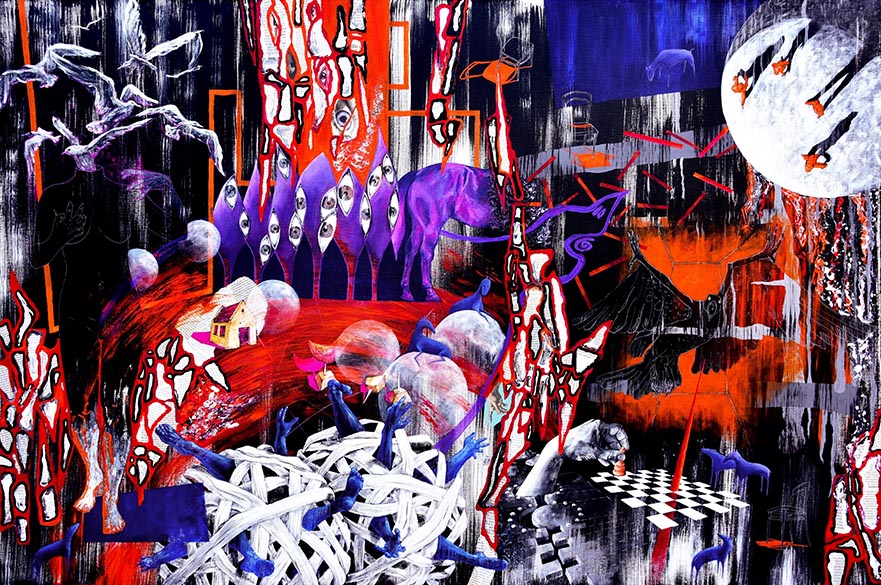Filmmaking MA
About this course
Situated within the Nottingham School of Art & Design, the MA in Filmmaking challenges students to innovate within and beyond the boundaries of moving-image-making practices. You will be exploring and experimenting in both film production and exhibition, enhanced by intellectually stimulating discussions and workshops.
During your studies, you will create new and refreshing projects that communicate your cinematic voice, using moving image and sound to experiment with virtual production, emerging and established technologies, and drawing on analogue practices where appropriate.
Collaborating with creative practitioners across the school, you will undertake projects to advance your research and experimentation skills in moving image arts.
The MA Filmmaking is suitable for all creative practitioners keen to undertake research-informed projects in the continuously transforming field of independent and experimental filmmaking.
What you’ll study
The curriculum has flexible features to enable students to direct their own journey. It is highly personalised to support students entering from different backgrounds and experience, this particularly includes experimentation in the first part of the year and the negotiation of the personal film project.
Students may arrive with varying degrees of technical skills, and so there is a range of technical workshops and drop-in support for students to 'up-skill' and personalise their development.
Individual objectives will be discussed and agreed, with appropriate support and learning strategies in place to enable students the necessary academic and technical skills to progress their project and into their chosen career.
Culture and Collaboration, delivered at the start of the course, enables students from all post-graduate courses in the School to come together. This will support sharing of practice and networks, where students can learn from each otherto build supportive relationships extending their skills throughout the course.
Students negotiate their own project outputs providing a more personalised experience tailored not only to their individual strengths, but also to their career intentions.
Filmmaking equipment is available ensuring all students are supported.
Culture and Collaboration
(20 credits)
This module aims to enable students to; 1) Begin to develop an advanced level of understanding of the wider cultural context for current and future work; 2) Begin to develop advanced level skills in research, analysis, idea generation, critical thinking, communication, and presentation; 3) Collaborate with others around a negotiated theme relevant to current debates relevant to art & design theory and practice to produce a selected outcome contributing to a collective festival of ideas.
Film Experiments
(40 credits)
In this module you will identify your cinematic voice through making a series of film experiments centred around intellectually stimulating debates. You will creatively respond to key themes in film, literature, and art; for example, film space and time, perspectives, defamiliarisation, concept film, and expanded cinema. Through seminars, tutorial discussions, and practical skill workshops, ideas for short experimental films and moving image art will be presented, realised, and screened, using established and emerging technologies.
Film Project
(100 credits)
In this module you will undertake an individual, guided project to create an innovative film or moving image installation to be screened or exhibited at an end of year festival.
You will be encouraged to support each other’s projects to share skills and advance your practice as a creative leader and collaborator. Through guest lectures, seminars, and workshops, the module provides a platform for collaboration, research, and experimentation, and the opportunity to specialise in a discipline of filmmaking, such as camera, writing, sound or artist film and video.
The end-of-year festival is organised as part of this module to enable you to form connections and engage with the wider community through your research-informed, creative work.
Optional Modules:
Professional Futures
(20 credits)
This module aims to bring together students from all Design & Digital Arts subject areas to act as a catalyst for future gazing and cross-disciplinary debate and discussion in employment, enterprise and innovation.
Advanced Research Design: Maximising Your Methods
(20 credits)
This multi-disciplinary module provides an explorative platform for students seeking further research-based study. Students can extend their knowledge of research methods and methodologies to enhance their future professional practice, or are considering progression to PhD study.
We regularly review and update our course content based on student and employer feedback, ensuring that all of our courses remain current and relevant. This may result in changes to module content or module availability in future years.
Video Gallery
How you're taught
You will be taught through a variety of teaching and learning experiences which will include:
- Active collaborative learning
- Learning through research
- Online or Blended learning
- Autonomous learning
- Buddying
- Experiential learning
- Guest speaker
- Interdisciplinary learning
- Negotiation
- Networking
- One-to-one tutoring
- Peer learning
- Practical
- Professional practice
- Public thinking
- Reflection
- Risk-based learning (assessed on process rather than output)
- Scholarship
- Seminar
- Small group tutoring
- Wonder learning
- Workshop
How you're assessed
The assessment journey enables students to move through a sequence of Experiment - Propose - Complete - Reflect.
Formative feedback opportunities are scheduled throughout the modules to enable students to understand their progress, and where they can further develop their work ahead of final module assessments.
The course culminates in a final project, in which the outcome is negotiated between the student and tutor, and is fully personalised in the student's areas of interest.
Students will also undertake a final reflection of their learning, experience and future direction at the end of the course.
Contact hours
20% lectures/seminars/workshops/tutorials, 80% independent study.
Careers and employability
The course is designed with various opportunities for engagement with the creative industries and integrates work-like experiences.
Guest lectures will be delivered by experts in their field. The course has contacts with independent filmmakers who draw on research and experimentation, producers who are successful in obtaining funding for moving image art, curators of works that sit outside the mainstream, and specialists (sound, camera, etc.) frequently working in the field of independent or experimental cinema.
The 100-credit module Film Project follows a work-like trajectory from development to exhibition. Students present a proposal to an industry panel and will receive advice on how to progress. After the completion of their projects, an end-of-year festival will be organised following a guest lecture on film festival curation. The festival itself is an outward-facing event to further support engagement with industry and networking with the wider community, locally and internationally.
Campus and facilities
Entry requirements
UK students
Academic entry requirements: 2.2 honours degree in a related subject.
Other requirements: a creative portfolio.
Additional requirements for UK students
There are no additional requirements for this course.
Other qualifications and experience
We welcome applications from students with non-standard qualifications and learning backgrounds and work experience. We consider credit transfer, vocational and professional qualifications, and any work or life experience you may have.
You can view our Recognition of Prior Learning and Credit Transfer Policy which outlines the process and options available, such as recognising experiential learning and credit transfer.
Getting in touch
If you need more help or information, get in touch through our enquiry form.
International students
Academic entry requirements: 2.2 honours degree in a related subject. We accept equivalent qualifications from all over the world. Please check your international entry requirements by country.
Other requirements: a creative portfolio.
English language requirements: See our English language requirements page for requirements for your subject and information on alternative tests and Pre-sessional English.
Additional requirements for international students
There are no additional requirements for this course.
English language requirements
View our English language requirements for all courses, including alternative English language tests and country qualifications accepted by the University.
If you need help achieving the language requirements, we offer a Pre-Sessional English for Academic Purposes course on our City campus which is an intensive preparation course for academic study at NTU.
Other qualifications and experience
We welcome applications from students with non-standard qualifications and learning backgrounds and work experience. We consider credit transfer, vocational and professional qualifications, and any work or life experience you may have.
You can view our Recognition of Prior Learning and Credit Transfer Policy which outlines the process and options available, such as recognising experiential learning and credit transfer.
Sign up for emails
Sign up to receive regular emails from the International Office. You'll hear about our news, scholarships and any upcoming events in your country with our expert regional teams.
Getting in touch
If you need advice about studying at NTU as an international student or how to apply, our international webpages are a great place to start. If you have any questions about your study options, your international qualifications, experience, grades or other results, please get in touch through our enquiry form. Our international teams are highly experienced in answering queries from students all over the world.
Policies
We strive to make our admissions procedures as fair and clear as possible. To find out more about how we make offers, visit our admissions policies page.








